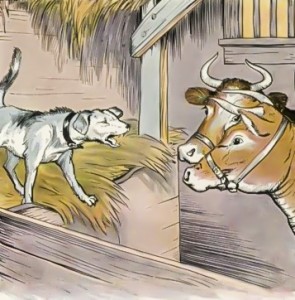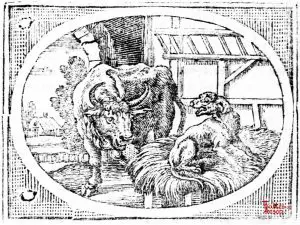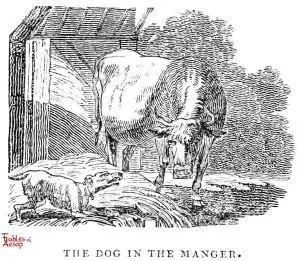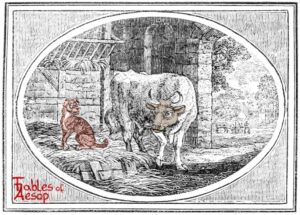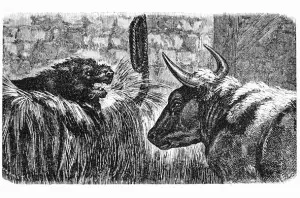People often begrudge others what they cannot enjoy themselves. A dog sleeping on hay would not let other animals eat from the hay.
People often begrudge others what they cannot enjoy themselves.

Aesop For Children
A Dog asleep in a manger filled with hay, was awakened by the Cattle, which came in tired and hungry from working in the field. But the Dog would not let them get near the manger, and snarled and snapped as if it were filled with the best of meat and bones, all for himself.
The Cattle looked at the Dog in disgust. “How selfish he is!” said one. “He cannot eat the hay and yet he will not let us eat it who are so hungry for it!”
Now the farmer came in. When he saw how the Dog was acting, he seized a stick and drove him out of the stable with many a blow for his selfish behavior.
Moral
Do not grudge others what you cannot enjoy yourself.

Eliot/Jacobs Version
A Dog, for its afternoon nap, jumped into the Manger of an ox and lay there on the straw. The ox, returning from its afternoon work, came up to the Manger and wanted to eat some of the straw. The Dog, in a rage being awakened from its slumber, stood and barked at the ox, and whenever it came near attempted to bite it. At last the ox had to give up the hope of getting at the straw, and went away muttering.

Samuel Croxall
A DOG was lying upon a manger full of hay. An Ox, being hungry, came near, and offered to eat of the hay; but the envious, ill-natured cur, getting up and snarling at him, would not suffer him to touch it, Upon which the Ox, in the bitterness of his heart, said, A curse light on thee, for a malicious wretch, who wilt neither eat hay thyself, nor suffers others to do it.
THE APPLICATION
Envy is the most unnatural and unaccountable of all the passions. There is scarce any other emotion of the mind, however unreasonable, but may have something said in excuse for it; and there are many of these weaknesses of the soul, which, notwithstanding the wrongness and irregularity of them, swell the heart, while they last, with pleasure and gladness. But the envious man has no such apology as this to make; the stronger the passion is, the greater torment he endures, and subjects himself to a continual real pain, bv only wishing ill to others. Revenge is sweet, though cruel and inhuman; and though it sometimes thirsts even for blood, yet may be glutted and satiated. Avarice is something highly monstrous and absurd; yet, as it is a desire after riches, every little acquisition gives it pleasure; and to behold and feel the hoarded treasure, to a covetous man is a constant, uncloying enjoyment. But envy, which is an anxiety arising in our minds, upon our observing accomplishments in others, which we want ourselves, can never receive any true comfort, unless in a deluge, a conflagration, a plague, or some general calamity that should befal mankind: for, as long as there is a creature living, that enjoys its being happily within the envious man’s sphere, it will afford nourishment to his distempered mind: but such nourishment as will make him pine, and fret, and emaciate himself to nothing.

Thomas Bewick
A Dog was lying upon a stall full of hay. An Ox, being hungry, came near, and offered to eat of the hay; but the ill-natured Cur getting up and snarling at him, would not suffer him to touch it. Upon which the Ox, in the bitterness of his heart, said, A curse light on thee for a malicious wretch, who will neither eat hay thyself, nor suffer others to do it.
APPLICATION.
There are men in the world of so snarling, malevolent, and ill-natured a disposition, that they will even punish themselves, rather than put forth a finger to serve any one. It gives them a malignant kind of pleasure to have it in their power to cause trouble and vexation to others, whenever they have an opportunity of doing so; and could they have their will, they would shut out the light and warmth of the sun, and suffer the fruits of the earth to rot upon it, provided they could see those about them unhappy; and in thus taking delight in other people’s miseries, it of course follows that they are their own tormentors. These characters, in common life, are diabolical and detestable; but the evils they inflict, are only like a drop to the ocean, when compared to those which men of the same stamp shed abroad in the world, when, in an evil hour, they happen to be exalted to govern the affairs of a nation. Then, indeed, their baleful influence is felt in every direction: they may be termed fiends in human shape; for, as far as they are able, they thwart the benevolent intentions of Omnipotence, and the very breath of their nostrils seems to blast the happiness of mankind.
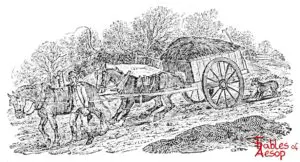

JBR Collection
A Dog was lying in a Manger full of hay. An Ox, being hungry, came near and was going to eat of the hay. The Dog, getting up and snarling at him, would not let him touch it. “Surly creature,” said the Ox, ” you cannot eat the hay yourself, and yet you will let no one else have any.”

Townsend version
A dog lay in a manger, and by his growling and snapping prevented the oxen from eating the hay which had been placed for them. “What a selfish Dog!” said one of them to his companions; “he cannot eat the hay himself, and yet refuses to allow those to eat who can.”

L’Estrange version
A churlish envious curr was gotten into a manger and there lay growling and snarling to keep the horses from their provender. The dog eat none himself, and yet rather ventured the starving his own carcase then he would suffer any thing else to be the better for’t.
Moral
Envy pretends to no other happiness then what it derives from the misery of other people, and will rather eate nothing it selfe then not starve those that would.

Crane Poetry Visual
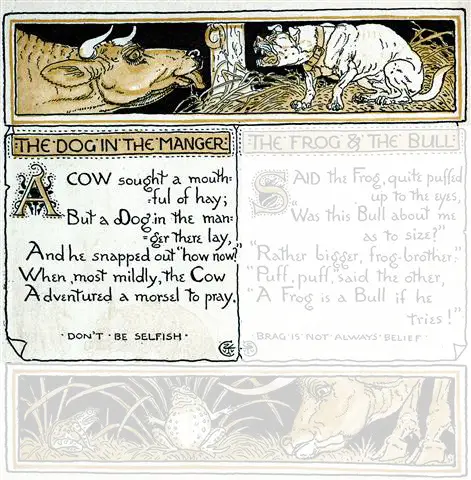
A Cow sought a mouthful of hay;
But a Dog in the manger there lay,
And he snapped out “how now?”
When, most mildly, the Cow
Adventured a morsel to pray.
Don’t be selfish.

Canis in Praesepi et Bos
In praesepi faeni pleno decumbebat canis. Venit bos ut comedat faenum, cum canis, confestim sese erigens, tota voce elatravit. Cui bos, “Dii te, cum ista tua invidia, perdant,” inquit, “nec enim faeno ipse vesceris, nec me vesci sines.”
Perry #702
